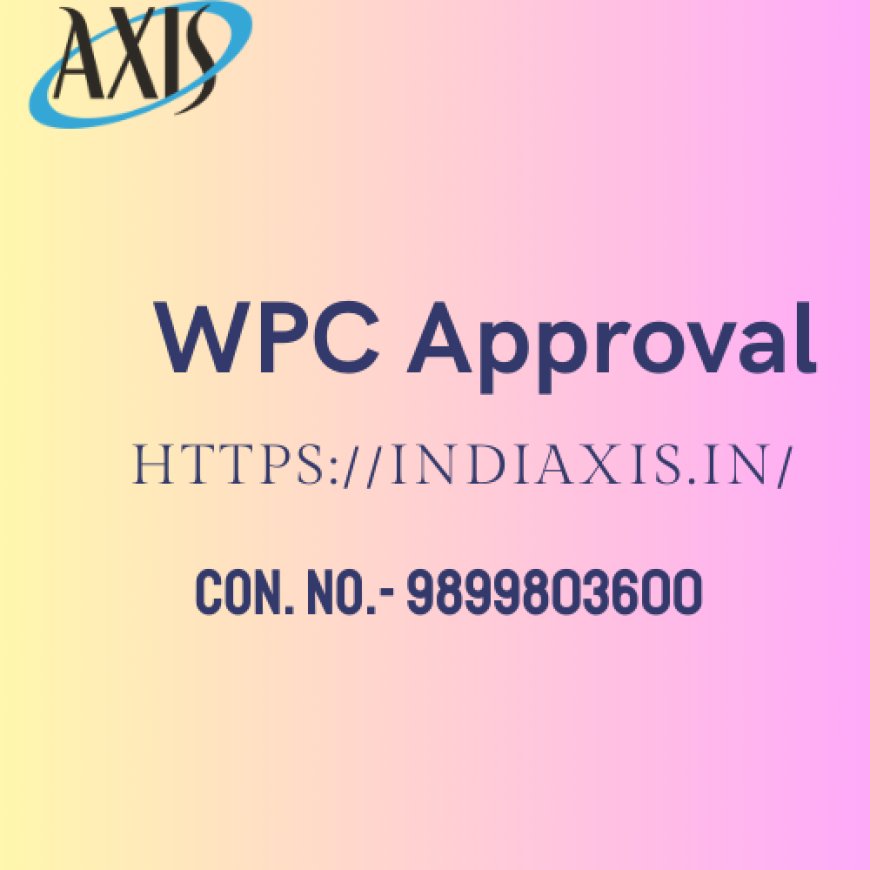WPC Approval
Get WPC Approval for wireless products in India. Ensure compliance with DOT regulations for hassle-free import, sale, and use of radio-frequency devices.

WPC approval is necessary to ensure that all wireless devices function within designated frequency bands and do not interfere with other communication systems. It prevents unauthorized use of spectrum and protects national security by regulating the import and sale of wireless communication equipment. Without this approval, businesses risk legal action, fines, and the confiscation of non-compliant devices.
The key reasons why WPC approval is important include:
-
Regulatory Compliance: Ensures devices comply with Indian telecommunication laws.
-
Avoids Interference: Prevents interference with existing networks and emergency communication systems.
-
Market Access: Enables businesses to legally market and sell wireless products in India.
-
Security and Safety: Ensures devices meet safety standards to prevent malfunctions and risks.
-
Boosts Consumer Confidence: Provides assurance to consumers and businesses about product reliability.
Categories of WPC Approval
There are different types of approvals issued by WPC depending on the nature of the product and its intended use. The primary categories include:
-
Equipment Type Approval (ETA):
-
Required for wireless equipment that operates in de-licensed frequency bands.
-
Common for products such as Wi-Fi routers, Bluetooth devices, RFID, and drones.
-
Manufacturers or importers must obtain ETA before selling the products in India.
-
-
Import License:
-
Necessary for importing wireless devices into India.
-
Issued to businesses dealing with communication equipment.
-
Ensures compliance with Indian radio frequency standards.
-
-
Demonstration License:
-
Granted for temporary use of wireless equipment in exhibitions, testing, and demonstrations.
-
Typically valid for a short period.
-
-
Experimental License:
-
Issued for research and development purposes.
-
Used by organizations conducting trials of wireless communication technology.
-
-
Dealer Possession License (DPL):
-
Required for dealers selling wireless products in India.
-
Ensures authorized distribution and sale of compliant equipment.
-
-
Non-Dealer Possession License (NDPL):
-
Required for individuals or organizations possessing wireless equipment for personal or research use.
-
-
Network License:
-
Necessary for businesses operating private networks using wireless technology.
-
Includes licenses for mobile networks, broadcasting stations, and telecom providers.
-
WPC Approval Process
Obtaining WPC approval involves several steps, each ensuring compliance with regulatory requirements. Below is a step-by-step breakdown of the approval process:
Step 1: Identify the Required Approval Category
Before applying, determine the type of approval needed based on the device's frequency band and intended use. Products operating in de-licensed bands require ETA, while others may need an import or network license.
Step 2: Prepare the Required Documents
Applicants must gather and submit necessary documents, including:
-
Technical specifications of the device.
-
RF Test Reports from an accredited laboratory.
-
Product datasheets and manuals.
-
Copy of the applicant's business registration certificate.
-
Authorization letter (if applying through a consultant).
-
Import/export details, if applicable.
Step 3: Testing and Certification
If the device operates in a de-licensed band, an RF Test Report from an authorized testing laboratory is mandatory. This ensures that the device complies with Indian radio frequency regulations.
Step 4: Online Application Submission
The applicant must submit the approval request through the Saral Sanchar Portal, the official government platform for WPC-related applications.
-
Register on the portal.
-
Upload required documents and test reports.
-
Pay the prescribed processing fee.
Step 5: Review and Approval
WPC officials review the submitted application and documents. If necessary, they may request additional details or clarifications. The review process may take a few weeks, depending on the complexity of the application and product category.
Step 6: Issuance of WPC Approval
Once the application is approved, the applicant receives the necessary certification, such as ETA or an import license. The approval allows legal import, sale, or operation of the device within India.
Documents Required for WPC Approval
The documents required for WPC approval vary depending on the type of application. However, common documents include:
-
Application Form (duly filled and signed).
-
Product Technical Specifications.
-
RF Test Reports (from accredited labs).
-
Copy of Business Registration.
-
Authorization Letter (if submitted through a consultant).
-
GST Certificate and Import-Export Code (IEC) for import licenses.
-
Equipment User Manual.
-
Invoice and Purchase Order (if applicable).
Challenges in Obtaining WPC Approval
While the WPC approval process is structured, applicants often face challenges, including:
-
Complex Documentation:
-
Ensuring all required documents are correctly formatted and submitted can be challenging.
-
-
Delays in Processing:
-
The review and approval process can take several weeks, causing delays in product launch and importation.
-
-
Technical Compliance Issues:
-
Devices failing RF testing must be modified and re-tested, leading to additional costs and time consumption.
-
-
Lack of Awareness:
-
Many businesses, especially startups, are unaware of WPC regulations and requirements.
-
Solutions to Overcome Challenges
To streamline the WPC approval process, businesses can:
-
Work with Experienced Consultants: Engage professionals who specialize in regulatory approvals.
-
Plan Ahead: Start the approval process well in advance to avoid delays.
-
Use Accredited Testing Laboratories: Choose recognized labs for RF testing to prevent compliance issues.
Benefits of Obtaining WPC Approval
WPC approval provides multiple advantages, including:
-
Legal Compliance: Ensures adherence to Indian telecom regulations.
-
Market Authorization: Enables businesses to operate and sell legally.
-
Consumer Trust: Increases credibility and reliability of products.
-
Security and Safety: Ensures products do not interfere with critical communication networks.
-
Global Recognition: Helps businesses expand internationally by demonstrating compliance with regulatory standards.
Conclusion
WPC approval is an essential regulatory requirement for businesses dealing with wireless communication devices in India. Ensuring compliance with spectrum regulations helps maintain network integrity and prevent interference. By understanding the approval process, preparing necessary documents, and planning ahead, businesses can obtain certification smoothly and legally enter the Indian market.
What's Your Reaction?































